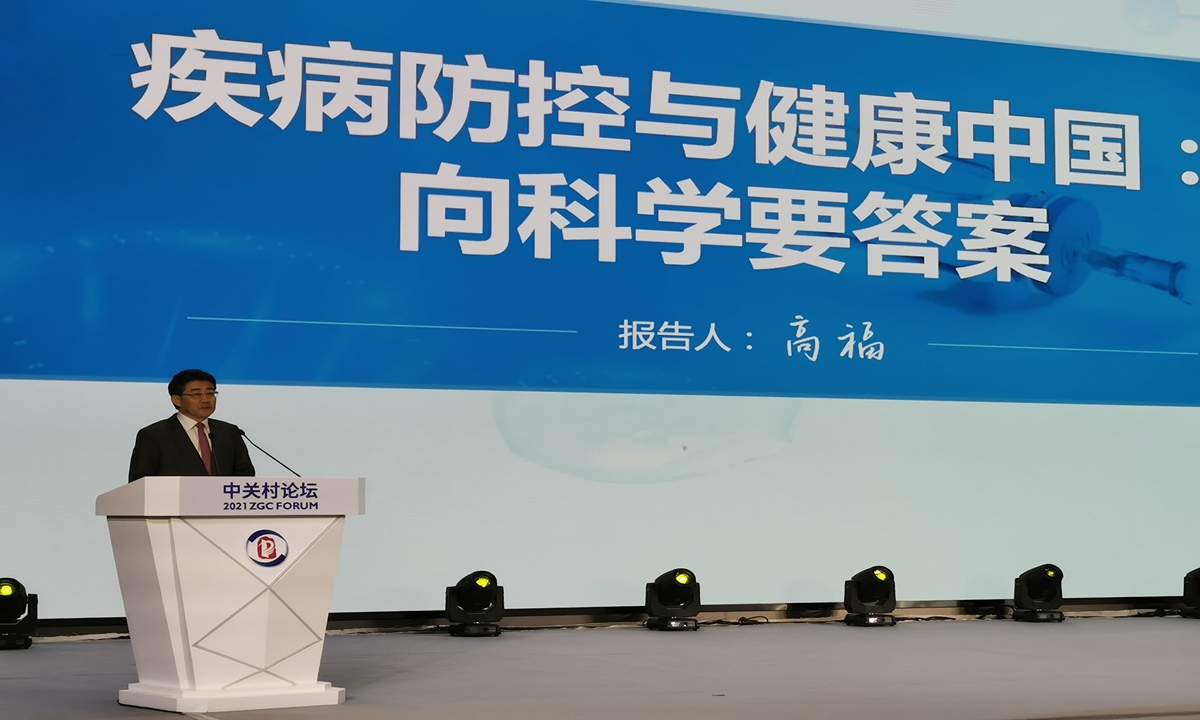
Gao Fu, director of Chinese Center for Disease Control and Prevention, makes a speech at the 2021 Zhongguancun Forum on Saturday. Photo: Xu Keyue/GT
The COVID-19 virus is “very likely” to have hidden somewhere in the world twenty years or fifty years ago, Gao Fu, director of Chinese Center for Disease Control and Prevention, said at the 2021 Zhongguancun Forum on Saturday.
“We have realized a few years ago that coronavirus could bring great challenge to human beings,” said Gao, noting that the COVID-19 pandemic is a “gray rhino” event rather than “black swan”event.
In his speech, Gao reviewed the coronaviruses that have been discovered since 1965. In 2004, a coronavirus named HCoV-HKU1 was isolated at the University of Hong Kong, but later studies have found that the HCoV-HKU1 was already present in a sample of virus stored in a refrigerator unit in Brazil in 1995.
"Tracing origins is a scientific question. Although today's novel coronavirus is called '19', it may turn out that it has already hidden somewhere 20, 30 or even 50 years ago." Gao Fu said.
Gao recalled that he participated in a tabletop demonstration focused on large-scale epidemics, called “EVENT201,” at Johns Hopkins University in the US. The hypothetical object of the demonstration was a coronavirus called “CAPS.” “We have realized that coronavirus would create great challenge to human beings, so our laboratories arranged researches into coronavirus,” Gao said.
In Gao’s speech, he also praised China’s dynamic zero policy focusing on virus suppression. “Is ‘zero cases’ policy good? Definitely! It’s good because it is scientific and in line with the principle that life is supreme,” noted Gao.
He called on the public to strengthen planning measures for risks brought by coronavirus and the share of vaccines globally. “If the world does not share vaccines, the world would share the virus,” Gao warned.
Other notable Chinese medical experts also made speeches at the forum.
Xia Ningshao, Dean of School of Public Health and Director of National Institute of Diagnostics and Vaccine Development in Infectious Diseases of Xiamen University, at the forum via audio introduced the China’s first influenza virus vector COVID-19 vaccine for intranasal spray. Xia said his team has finished the phase II clinical trial of the vaccine.
It will be effective 24 hours after a single dose of the intranasal-spray vaccine, which can respond to a sudden outbreak, said Xia. When a large number of COVID-19 cases occur and close contact cannot be quickly identified and controlled, the immune barrier can be rapidly built up through receiving this vaccine, said Xia, noting that the vaccination can provide a strong shield for large-scale conferences or sports events.
The two-dose of the intranasal-spray vaccination can offer longer protection, Xia said. Noting that the nasal vaccine is effective when used by senior residents and against variants.
In addition, the mix-and-match inoculations of the intranasal-spray vaccine and the inactivated vaccine can show higher efficacy, Xia noted.
Yin Zundong, research fellow of Chinese CDC said that China is mulling to start booster injection of COVID-19 vaccine. Key groups would enjoy priority to receive the booster injection six months after full vaccination, Yin said, noting that the groups include customs staff, medical workers, the immunocompromised, people aged over 60 and those who plan to travel abroad for study and business.
A mass booster vaccination program is still being considered, Yin said.

